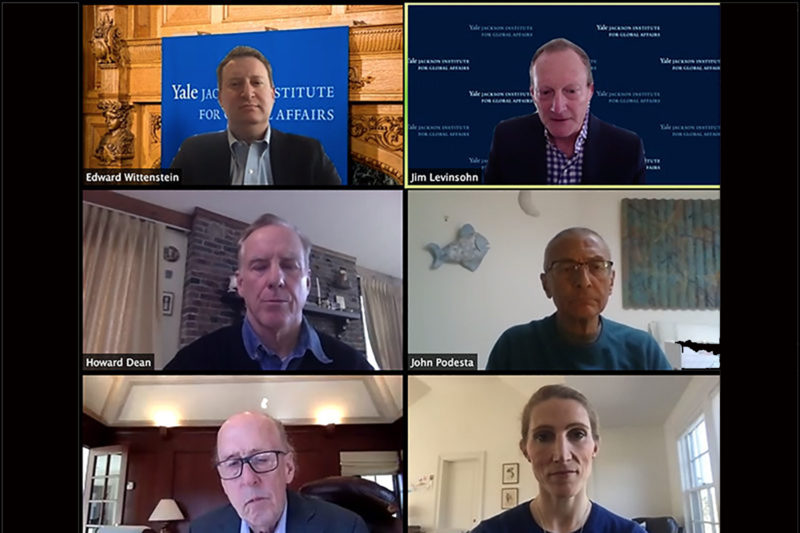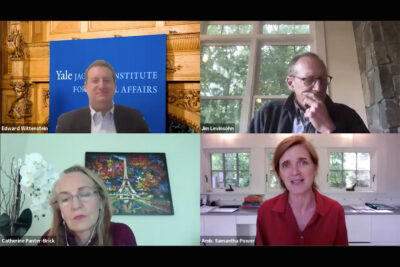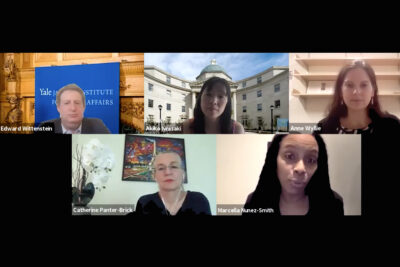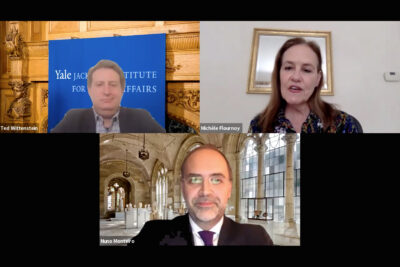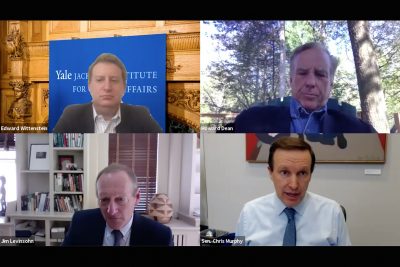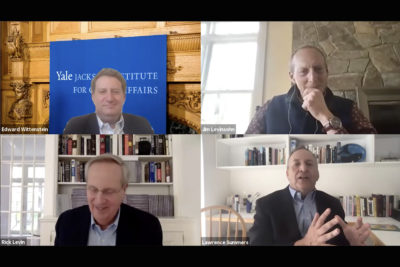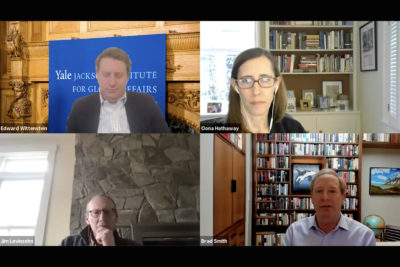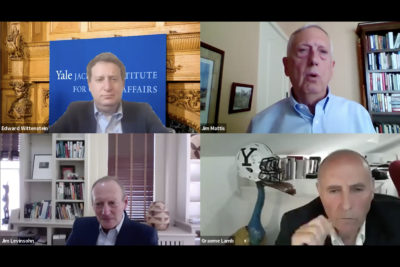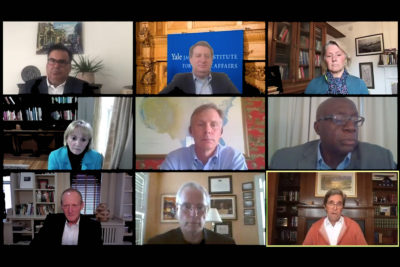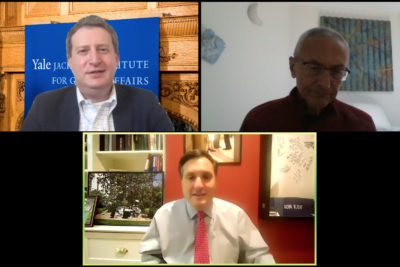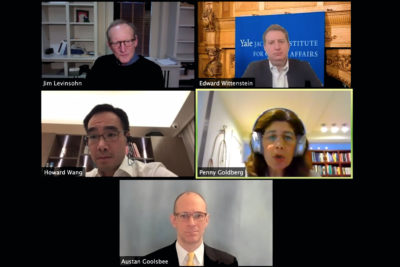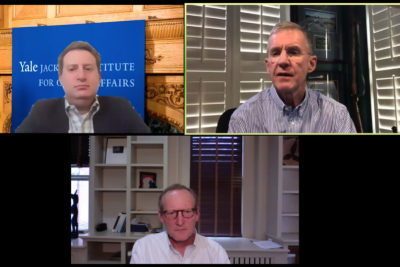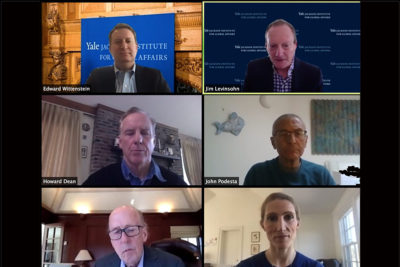In March 2020, Jackson launched its Virtual Discussion Forum series on the COVID-19 crisis and its far-reaching impact worldwide.
Events in the Series
June 10, 2020 | How The Pandemic Will Shape International Politics
500 attendees tuned in for the final Jackson Virtual Discussion Forum of the spring on June 10, 2020. Ambassador Samantha Power, former U.S. Permanent Representative to the United Nations and Anna Lindh Professor of the Practice of Global Leadership and Public Policy, Harvard Kennedy School, addressed “How the Pandemic Will Shape International Politics.”
The discussion, part of Jackson’s Virtual Discussion Forum series on COVID-19 and Global Affairs, was moderated by Catherine Panter-Brick, Bruce A. and Davi-Ellen Chabner Professor of Anthropology, Health, and Global Affairs.
In her remarks, Power underscored the importance of global cooperation, a theme touched on by many other speakers in the discussion series. “Our fates are linked to the fates of others living elsewhere,” Power said.
Panter-Brick and Power discussed how leaders can rebuild confidence in international institutions such as the WHO. Leaders will have to “be more persuasive” and not take for granted that people see the benefits of them.
Power was asked to reflect on her time at the U.N., when the 2014 Ebola outbreak unfolded in West Africa. The logic of U.S. decision-making during that time “was rooted in the idea that we are connected,” Power said.
The Obama administration took the lead in sending health workers and supplies to the region and rallied other countries into pitching in. “That’s what it looks like when the international system works,” Power said.
“The logic at the heart of it was both humanitarian and this sense of connectedness and kind of enlightened self-interest you could call it,” she said.
Power also talked about the dangers of political polarization in the U.S., citing polls that showed Republicans expressed less support for lockdowns and social distancing measures in the early days of the COVID-19 pandemic.
“If you asked me what is the thing that keeps me up at night as a national security professional, it’s that. It’s our polarization. It’s the duality of the American experience,” Power said.
June 4, 2020 | Breakthrough Scientific Research at Yale
Three internationally renowned Yale scientists discussed their latest research findings and clinical observations during a June 4 discussion.
Professor Akiko Iwasaki, the Waldemar Von Zedtwitz Professor of Immunobiology and Molecular, Cellular and Developmental Biology; Dr. Marcella Nunez-Smith, Associate Professor of Medicine and Epidemiology, Director, Equity Research and Innovation Center; and Professor Anne Wyllie, Associate Research Scientist in Epidemiology (Microbial Diseases) were the featured speakers during the event, which was moderated by Catherine Panter-Brick, Bruce A. and Davi-Ellen Chabner Professor of Anthropology, Health, and Global Affairs.
More than 140 attendees tuned in to hear about the latest findings in vaccine development, saliva testing, and antibodies and immunity.
May 28, 2020 | Geopolitics and Strategy
Nearly 200 attendees tuned in to hear from two national security strategy experts on the impact of the COVID-19 crisis during a May 28 discussion.
Michèle Flournoy, Former Under Secretary of Defense for Policy, Co-Founder of the Center for a New American Security, and Managing Partner of WestExec Advisors, and Nuno Monteiro, associate professor of political science at Yale and an expert in international relations theory, held a wide-ranging conversation.
Flournoy was asked to comment on whether the pandemic will force the U.S. to rethink its approach to national security.
“As we come out of this crisis, our definition of national security will be broadened to include things like being better prepared to prevent or handle pandemics in the future,” she said.
Climate change mitigation may also become a national security issue, Flournoy observed. “The pandemic will change the parameters of the debate on national security,” she said.
Flournoy also touched on a theme addressed in her recent op-ed, which assessed how different countries handled the early days of the crisis and why some fared better than others, namely South Korea, Germany and New Zealand. Compared to the U.S., Flournoy said, these countries have better social cohesion, greater investment in health infrastructure, and a leader who acted took swift, decisive actions to manage the crisis.
Monteiro and Flournoy also touched on the U.S.-China relationship and possible responses we can expect from Iran, North Korea and Russia.
May 20, 2020 | A View from the U.S. Senate
About 200 attendees tuned in for the May 20, 2020 Jackson Virtual Discussion Forum, “COVID-19 and Global Affairs: A View from the U.S. Senate,” featuring U.S. Sen. Chris Murphy. Gov. Howard Dean served as the moderator.
When asked to reflect on his vision for the U.S. five years out, Murphy asserted that pandemics, a warming climate, and violence by stateless actors were the greatest threats facing the nation, not conventional military threats. “We are totally resourced for a world that doesn’t exist anymore,” Murphy said, citing the U.S. military’s huge budget versus the relatively small amount of funding earmarked for global public health.
“This crisis is exposing massive vulnerabilities,” Murphy said, including a dependence on China in the supply chain.
The pandemic is “an invitation to set up new capacities and to strengthen our alliances,” Murphy added.
May 13, 2020 | Prospects for Recovery in the World Economy
More than 500 attendees tuned in for the May 13 discussion, “Prospects for Recovery in the World Economy,” featuring Lawrence H. Summers, former Director of the National Economic Council, U.S. Treasury Secretary, Chief Economist of the World Bank, and President Emeritus of Harvard University.
The discussion was moderated by Richard Levin, President Emeritus of Yale University and Frederick William Beinecke Professor of Economics. Levin also serves as Co-Chair of the Education Committee for Connecticut Gov. Lamont’s Re-Open Connecticut Advisory Group.
“We’re in uncharted territory,” Summers remarked, likening the current situation to the aftermath of Hurricane Katrina, but on a national scale. “If you’re scared to leave your house, it doesn’t matter what the interest rate is,” Summers said.
When asked about the potential impact of the CARES Act, Summers observed, “Health investment is the most important stimulus measure.”
Summers predicted long-lasting societal changes due to the pandemic, including less business travel (“Zoom meetings work well,” he said), more emphasis on self-reliance and nationalism, and less comfort with the idea of living in dense urban environments.
Summer underscored the idea that part of the solution lies in global cooperation in the fight against common threats, including climate change, disease, refugees, and terrorism.
May 8, 2020 | Cyber Threats and Opportunities in the Digital Age
One of the world’s leading tech executives offered his insights on the technological ramifications of the pandemic. Brad Smith, the president of Microsoft and co-author of “Tools and Weapons: Promise and Peril in the Digital Age,” was the featured speaker in the May 8 installment of Jackson’s Virtual Discussion Forum on COVID-19 and Global Affairs.
Oona Hathaway, the Gerard C. and Bernice Latrobe Smith Professor of International Law and Director of the Center for Global Legal Challenges at Yale Law School, served as moderator for the conversation, “Cyber Threats and Opportunities in the Digital Age.”
Smith, whose company operates in 120 countries and had a “front row seat” on the crisis, was asked to comment on the economic and security implications of moving so many aspects of our lives online so quickly. Smith touched on the digital divide and the lack of broadband access as a barrier for many, and predicted a need for more digital skills as the crisis continues into the fall.
He offered some simple advice for improving security: use two-factor authentication. “It’s like putting on a seatbelt in a car,” he explained.
Smith also commented the need for multilateral cooperation and new global norms for cybersecurity. “The pandemic has shined a light on the issue,” he said, particularly on the importance of protecting our elections and our hospitals from cyber attacks.
“This is an opportunity to think harder on something that demands attention,” Smith said.
More than 280 attendees joined the online discussion and submitted questions.
May 1, 2020 | The United States and Its Allies Under Stress
More than 380 attendees tuned in to the May 1 discussion, “COVID-19 and Global Affairs: The United States and Its Allies Under Stress” featuring Gen. Sir Graeme Lamb, former director of UK Special Forces and Commander of the British Field Army, and Gen. Jim Mattis, former U.S. Secretary of Defense and Commander of U.S. Central Command.
The speakers offered their candid assessments in many dimensions of the issue, including the possibility of a global recession, the fragility of supply chains, the competence of leaders, and whether the social contract is in jeopardy.
April 24, 2020 | Crisis Diplomacy
More than 700 attendees tuned in to the April 24 discussion on crisis diplomacy. Six former U.S. ambassadors took part in the conversation, which was moderated by former Sec. John Kerry, the Distinguished Fellow in Global Affairs at Yale. Ted Wittenstein, Jackson’s deputy director for leadership programs, and Jim Levinsohn, Jackson’s director, offered brief opening remarks and introductions.
Panelists included:
- Amb. Robert Ford, Kissinger Senior Fellow and former Ambassador to Syria and Algeria
- Amb. Francisco (“Paco”) Palmieri, Jackson Senior Fellow and former Acting Assistant Secretary of State for Western Hemisphere Affairs
- Amb. Anne Patterson, former Jackson Senior Fellow and Ambassador to Egypt, Pakistan, and Colombia
- Amb. David Rank, Jackson Senior Fellow and former Acting Ambassador to China
- Amb. Harry K. Thomas, Jr., Kissinger Senior Fellow and former Ambassador to Zimbabwe, Bangladesh, and the Philippines
- Amb. Susan Thornton, Paul Tsai China Center Senior Fellow and former Acting Assistant Secretary of State for East Asian and Pacific Affairs
April 16, 2020 | Lessons Learned from the Ebola Crisis
The discussion featured the following panelists:
- Ron Klain, former Chief of Staff to Vice President Biden and White House Ebola Response Coordinator
- John Podesta, Jackson Senior Fellow and former White House Chief of Staff
Ted Wittenstein, deputy director for leadership programs at Jackson, moderated the conversation.
Panelists discussed the Obama administration’s response to the Ebola crisis; weighed in on the current administration’s handling of the COVID-19 pandemic; and offered their thoughts on what’s needed to roll out widespread testing and eventually, a vaccine.
They also took questions from the 165+ person virtual audience.
April 9, 2020 | The Economy and World Markets in Turmoil
The discussion featured the following panelists:
- Pinelopi Goldberg, former Chief Economist of the World Bank Group and Elihu Professor of Economics and Global Affairs at Yale
- Austan Goolsbee, former Chair of the Council of Economic Advisers and Robert P. Gwinn Professor of Economics, University of Chicago
- Howard Wang, Head of Greater China, J.P. Morgan
The talk was moderated by deputy director for leadership programs, Ted Wittenstein, with an introduction with Jackson’s director, Jim Levinsohn.
Panelists addressed a wide range of topics related to the economic turmoil resulting from the COVID-19 pandemic and the way forward. They also took questions from the 200+ person virtual audience.
April 3, 2020 | Leadership in Crisis
The discussion featured Jackson Senior Fellow Gen. Stan McChrystal and was moderated by deputy director for leadership programs, Ted Wittenstein, with an introduction with Jackson’s director, Jim Levinsohn.
McChrystal kicked off the conversation by emphasizing the significance of the pandemic. “COVID-19 is going to change us dramatically. This is a big wake up call that we are globally connected and that globalization is here,’” McChrystal said.
The impacts of globalization, McChrystal explained, are seen clearly in both the fast spread of the virus across the world and COVID-19’s impact on all aspects of life. “For many parts of our lives, we are absolutely dependent upon other parts of the world. China is the one that rises to most consciousness. Most of our drugs are produced in China, all of our penicillin is produced in China,” he said.
McChrystal was also asked to reflect on the discipline that he teaches at the Jackson Institute—leadership. “During a time like this, what sort of leaders do we need? What sort of leaders do we want?”
McChrystal identified the ideal leader in a crisis as someone who is honest, competent, committed, and inspirational with a clearly directed plan that they are able to deliver to fruition. “I want that leader to remind me that I’m supposed to be a bigger person that I might want to be in that moment,” he said.
McChrystal also emphasized the need for coordinated action from the federal government. “There needs to be at the national level, the equivalent of a fusion cell… when I say fusion cells I mean entities that bring in different capabilities and expertise from FEMA to state government,” he said.
McChrystal fielded questions from the 280-person (virtual) audience on a variety of subjects, including what the United States can learn from global leadership; social cohesion during a crisis like COVID-19; the role of the military; and the far-reaching impact of the pandemic on the business sector.
March 27, 2020 | Health, Politics & Economics in an Uncertain World
The panel discussion featured four Jackson Senior Fellows whose backgrounds ranged from public health to government and finance, including:
- Dr. Vanessa Kerry, Director of the Global Public Policy Program, Harvard Medical School
- John Podesta, former White House Chief of Staff
- Stephen Roach, former Chairman of Morgan Stanley Asia
- Dr. Howard Dean, former Governor of Vermont
Kerry kicked off the discussion with a brief overview of where things stand in the U.S. “We are all shared in the vulnerability of COVID[-19]… [but] New York now though is not only the epicenter of the United States but the epicenter of the world,” Kerry said.
The dire situation unfolding in New York City was not inevitable, Kerry said. “In an age of globalization and at a time when population is much more dense than it has ever been in human history, spread was inevitable,” she said, suggesting that the United States should have done more initially to stop the spread through securing American borders and significantly ramping up testing. Now, in order to effectively contain the virus as South Korea and China have done, there must be aggressive testing, quarantining, and social distancing measures put in place across the United States as a whole in order to “flatten the curve.”
Dean echoed Kerry’s remarks about the direness of the current pandemic, blaming the decentralized American governmental system and a weak executive office response for the slow movement towards mandatory national social distancing.
“This is going to take a lot of social distancing, it’s going to take a lot of money to prevent our economy from a complete collapse. It’s going to take national leadership which we are not going to have any of until January at the earliest but we do have some strengths: the states are strong,” Dean said.
John Podesta was asked to comment on the role of executive leadership and engagement in times of crisis. “You have to give honest, direct, credible information to the public,” he said.
Steve Roach emphasized the drastic differences between the current economic crisis and the Great Recession of 2008. The legislative stimulus package created in response to this downturn will “not lead to a rejuvenation of consumer spending and aggregate demand,” Roach said, until the pandemic has been fully handled.
The four panelists fielded questions from the audience on a variety of topics, including the leadership challenges this pandemic poses, the public health and national coordination necessary to tackle COV-19, as well as the geopolitical consequences of the virus.
More than 250 people tuned in to the discussion, which was held via Zoom Webinar.
